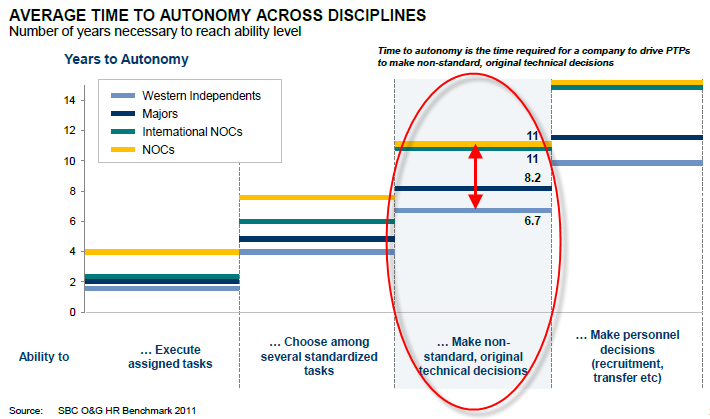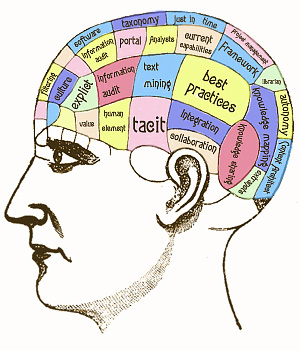How Knowledge Management can effectively serve the organization governance
Submitted by Catherine Boissonnet on Thu, 18/09/2014 - 11:15This interesting article about decision making emphasizes the close link between the treatment of internal and external information, understanding of events resulting from it, their transformation into knowledge and decision making.
From the working hypothesis of the author, that decision making can be defined as knowledge management in real time, it is crucial that organizations adopt a comprehensive KM strategy: its policy, its implementation and technological support.
Social KM and its fundamental principles give meaning here:
- Facilitate the appropriate use of information provided by people,
- by their qualification, responsible dissemination, capitalization and
- their promotion through exchanges.
Return On Knowledge (ROK) for Knowledge Networks
Submitted by Catherine Boissonnet on Tue, 05/02/2013 - 12:58Schlumberger Business Consulting (SBC) compared 37 companies within the Oil and Gas sector in relation to the time that their experts and engineers spent on becoming autonomous (the autonomy delay). In other words, the time required for these experts & engineers to make nonstandard technical and original decisions.
Knowledge Management makes a difference..
The outcome was that an "innovative" organization gains between 3 to 5 years of autonomy as compared to so called "traditional" companies. SBC’s conclusion was that, one of the main reasons for this outperformance was the widespread use of Knowledge Management (KM).
Knowledge Management as practiced today is a proven technology and can truly measure a Return on Investment (ROI).
Let’s term this ROI as ROK ! Return On Knowledge.
This ROK will become more and more important as organization’s implement and rely on networks centered on structured knowledge. This leads us to the fact that networks and knowledge are inseparable. Networks are a mine field of knowledge, where knowledge is created, shared, validated and reused over and over again. In other words, knowledge breathes life into these network(s), which are the basic principles of Social KM (SKM).
What will be expected of these knowledge networks?
- Record, index and classify within various Data Bases (DB) the lessons learnt and “know-how” feedback.
- Create linkages and knowledge transfer processes between learning professionals and senior knowledge holders (an example amongst many).
The value of KM lies within the network, in other terms; the value is derived from the collective network by using individuals, activities or processes as key building blocks.
Companies must take into account the impact of Knowledge Networks on their organizations. Not only are companies the guarantor of knowledge preservation (retirements, turnover, etc.), but should also take advantage of the numerous opportunities for innovation implementation.
Interview d'expert : Jean-Louis ERMINE, Directeur de l'innovation, TELECOM Business School, FR
Submitted by Chloe Jacquety on Thu, 06/09/2012 - 09:09
What is your vision on Knowledge Management future ? What do you think the main trends are today and will be in the next years ?
Ten years ago, some polemical articles developped the idea that two KM strategies compete on the basis of culture, history, nature of business, etc.
- - A strategy of codification, by codifying knowledge into information (database, document databases, semi-structured data...)
- - A strategy of socialization, by managing knowledge flows through people. Tacit exchanges.
According to that theory, organizations should choose one or the other of these strategies, the two of them being incompatible. Yet studies show that companies works in a 50/50 mode, depending on their nature, their culture, etc. For instance a company with a strong engineering culture will be more in the codification while a consulting company will use the socialization model. In the future, I think that KM will be a mix of both strategies, using different tools, methods and strategic management. Codification and socialization, both strategies are operative. The two approaches are not opposed but complementary!
How organizations can use Knowledge Management to improve their competitiveness and optimize their businesses results? And what are the main expected benefits?
There are two ways to deal with KM in companies:
- - The defensive one: it consists in preventing the risk of loss of skills (for instance, developed countries are going to lose 40% of their workforce in the next 10 years because of massive retirement, that necessarily implies some knowledge loss) or no strategy of skills management (no strategic analysis of the knowledge portfolio, no anticipation, see Kodak for the digital photography for instance).
- - The Offensive one:
- > improving productivity: An OECD Study shows that companies that make KM a strategic priority increase their productivity.
- > enhancing the economic value with Knowledge Capital: stock market appreciate companies that have an important Intangible Capital, including Knowledge Assets.
- > improving the competitiveness: definitely, market shares are now conquered with knowledge and innovation in products and services.
To answer the question How?: It is necessary to initiate a “KM virtuous cycle” in four steps:
- Strategic analysis of the knowledge portfolio: mapping of Critical and Strategic Knowledge
- Knowledge capitalization: creating a structured repository of accessible, shared, scalable knowledge portfolio, codification and socialization… in short a “Knowledge Business Plan”.
- Knowledge Sharing: designing social tools, learning tools, etc.
- Innovation: designing an Innovation platform based on the knowledge repository.
The KM Virtuous Cycle is a process loop which enables the renewal of knowledge portfolio.
We just talked about the business benefits on a global perspective, but what are the benefits for employees?
There are benefits at all levels, not only for managers and stakeholders. It is essential to integrate the employees in the full cycle (strategic, operational, innovation). Benefits may be not enough recognized but they are real:
- - Employees need recognition of their knowledge, their skills, their function…
- - They love to share: "Knowledge shared is knowledge squared"
- - They don’t necessarily experienced sharing as a loss of power
- - They need Self-accomplishment within their job
For instance, in some engineering companies, there are “levels of expertise” patterns that rewards the knowledge contribution of employees. Thanks to this kind of approach, people can be recognized for the value of their knowledge which is very rewarding. The problem is that companies which only think about the bottom-line, the production process, don’t often realize it. Other type of benefits can be reached through KM: Customer Knowledge Management for instance provides better knowledge of customers to improve customer relationships management…
What are your recommendations to start an effective Knowledge Management project and its successful roll-out?
For the project deployment, organizations should adopt the “Water Lily strategy”. The water lily evokes a well known childish riddle: « a water lily doubles its surface every day, if it already took forty days to cover half of the pond, how many days are needed to cover the entire pond? ». An imprudent and too fast answer would be « eighty days» while considering that as much time is necessary to cover one half that the other. This answer neglects the water lily nature and the initial hypothesis! If you transcribe this riddle in term of project management, it may be: « a KM project is expensive, if the project costs 40 M€ to cover the needs for managing half of the Knowledge Capital, how much will be needed for managing the entire Knowledge Capital?». The linear extrapolation of costs will answer undoubtedly rather toward 80 M€ than 41M€! One doesn't have the habit to evoke the hypothesis of the water lily in this kind of problem.
Yet a KM project is not linear, but of exponential growth. The overall cost benefit from experience. Small projects that succeed are then spread within the organization. The Water Lilly is a strategy with constant effort and exponential results. My recommendation: when it comes to KM, do not use a “roadmap” strategy it does not work! Organizations must instead start small. It is the best way to include the change process, incentive factors, and the emergence phenomenon in complex systems. Organizations will also need the commitment of the top management. The benefits multiply with a constant energy injection.
In short: Start too small!
In your opinion, what are the major hurdle to overcome and the pitfalls to avoid?
- - 1st trap: "everything is information". > KM is NOT information management and information tools are not enough.
- - 2nd trap: assigning the KM strategy to HR only. > HR must work with other departments (strategy, information systems, quality, operationnal department…) and with “field people” as it is from them that most KM requests come…
- - 3rd trap: starting too big at the beginning of the project…
- - 4th trap: "we have always done it this way" so the usual tools (training, documentation, database, talent management, etc.) are enough. > It is completely untrue because we have entered the new era of knowledge economy and must make the transition from knowledge as an “handicraft” to knowledge as an “industry”. The issue is historically new as, for instance, the extent of the aging population in the scale of humanity. The importance of knowledge in the economy also has a new dimension therefore is no longer handled with traditional tools. That’s why KM has to be reviewed in new perspectives, to be optimized and developed.
Do you think there are cultural specificities on Knowledge Management maturity depending on your geographical location?
For sure !
For example: there are socialization countries (e.g. Latin cultures) and codification countries (e.g. northern developed countries). The issues do not arise in the same way depending on countries. Depending on their historical situation, there are different approaches to the problem. For instance in India there is plenty of young people. For them, the main problem is "the last mile problem": they possess the knowledge, but 1 billion people need to be trained so for them this is more an issue of knowledge dissemination. In the Industrialized countries we have exactly the opposite: we are going to lose 40% of our workforce in the next 10 years therefore it’s more a knowledge preservation issue…
Knowledge & Pizza
Submitted by Chloe Jacquety on Tue, 03/07/2012 - 15:56- The more people who share a pizza, the less pizza for each person.
- The more people who share knowledge the more knowledge for everyone.
- Don't get confused between pizzas and knowledge.
Tim Backer
Portrait of the modern knowledge worker
Submitted by Chloe Jacquety on Mon, 23/04/2012 - 15:03Derniers billets
- How Knowledge Management can effectively serve the organization governance
- Return On Knowledge (ROK) for Knowledge Networks
- Interview d'expert : Jean-Louis ERMINE, Directeur de l'innovation, TELECOM Business School, FR
- Knowledge & Pizza
- Interview d'expert : Nicolas NADAL, IBM Global Services, FRANCE
- Interview d'expert : Jens Øjvind Nielsen, CEO LeadingCapacity ApS, DANEMARK
- Portrait of the modern knowledge worker
- Interview d'expert : Jean-Yves BARBIER, Ecole Polytechnique, FRANCE
- Interview d'expert : Stephanie Barnes, Chief Chaos Organizer, Missing Puzzle Piece Consulting, CANADA
- Interview d'expert : Pascal Bernardon, Directeur de Programme KM, FRANCE





